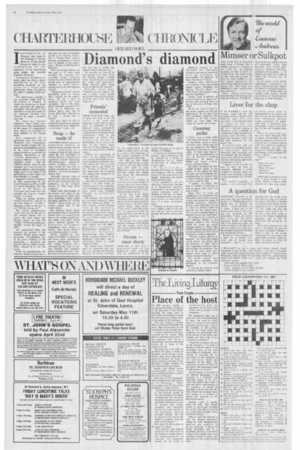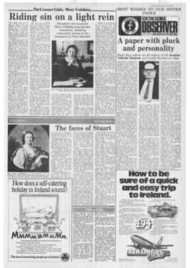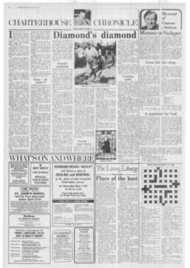Page 10, 19th April 1985
Page 10

Report an error
Noticed an error on this page?If you've noticed an error in this article please click here to report it.
Tags
Share
Related articles
Scottish Greetings
Irish Catholic Joins The Group
A Paper With Pluck And Personality
Church Heads
Glasgow Prelate Questions Labour On Life
Diamond's diamon
IJOURNEYED to Glasgow this week in the company of fellow directors of the Herald Group to share in the celebrations for the centenary of our flourishing sister paper, the Scottish Catholic Observer.
The success of the Observer in recent years has been a major contribution to the everincreasing prosperity of the group as a whole and appropriate tribute was paid to the paper's splendid editor and staff.
The celebrations included a civic reception kindly given by the Provost of Glasgow. It would be interesting to know what impression the pageantry associated with Glasgow's City Chambers would have made on the turbulent character who founded the paper a hundred years ago.
His name was Charles Diamond, whose family were evicted from their smallholding in the county of Londonderry after attacks on Catholics by local members of the Orange Order.
Such experiences left a permanent mark on a man of Diamond's fiery temperament whose humble origins did not prevent so considerable a success in the world of newspaper proprietorship as to earn him an eventual description as the "Catholic Harmsworth." The Glasgow Observer — as it was originally called — and the Catholic Herald, which he also founded, ran to no less then 34 separate editions. His newspaper empire grew at its zenith to 40 publications in every major city from Dundee to London.
Diamond entered Parliament in 1892, representing the old Irish Parliamentary Party as MP for North Monaghan. His first words in the House of Commons constituted what was probably the shortest "maiden speech" on reeord.
When an Orange member, Colonel Sanderson, referred to the Irish clergy as "ruffians," Diamond sprang to his feet to cry "Ruffian to you, sir!"
His reckless outspokenness stayed with him for life and on one ocasion landed him in prison. By sheer vigour and dogged energy he kept his "empire" afloat but exhaustion, literally, caused his death in 1934.
An unresolved libel suit rendered the position of the Catholic Herald group highly precarious. Providentially one or the great Catholics of his generation, a successful and popular solicitor, Ernest Vernon Miles, stepped in to buy the group.
Under his proprietorship, the Catholic Herald entered into a
new and even more flourishing period of its eventful history, due to Vernor Miles inspired decision, immediately on taking over, to appoint as the paper's editor, 34-year-old Michael de la Bedoyere.
Their partnership during the best par of 30 years made possible the immense and arguably unique influence exercised by the Catholic Herald during years of unprecedented changes in world history, opinion and social and religious outlook.
"Generous to a fault" was the description given of Vernor Miles outlook as the paper's owner. He was a man of' immense charm and deep conviction. One of the many gifted journalists spotted by the great de la Bedoyere was Andrew Boyle who said of Vernor Miles that "Ile died as he lived — utterly true to himself."
The same might be said of Charles Diamond whose original inspiration has never faded and — one hopes — never will.
Snap — he made it!
A RATHER different picture of proprietorial influence on editorial policy emerges with the recent publication of a fascinating book by Bert Hardy called My Life, (published by Gordon Fraser). It doubles as a stupendous "album" containing 300 photographs — almost all, without exception, brilliant taken during his long stint as leading cameraman on Edward Hulton's never-to-be-forgotten Picture Post.
Ironically, however, some of Hardy's best and most poignant pictures led, unintentionally and indirectly, to the eventual decline of that once great periodical.
Hardy took photographs of the Korean war, some of the most gruesome of which were never published. Those which did appear glorified the "United Nations" action which was, of course, mainly that of the United States.
But pictures which would have brought home in horrifying fashion what was actually being done to the civilian population, and might even have turned public opinion against the disastrous Vietnamese experiment even before it started, were among Hardy's most dramatic pieces of work.
Hardy, appalled by such things as brutality to prisoners and taken many subsequently famous photographs, recalls that "Jimmy Cameron and I were horrified by what we saw and checked very carefully before sending back our story. We knew it would cause trouble,
but one that it would also change Picture Post for ever."
He describes as "one of his best pictures ever" that "of an old Korean peasant walking along with his hands up among the rubble and destruction. Being liberated didn't mean much to him at that moment."
Ruefully, Hardy adds, "Contrary to the opinion still held in Fleet Street, people aren't only interested in pictures of pretty girls when they buy magazines."
Friends' memorial
THERE WAS NOT really time or space last week to do full justice to the work and inspiration, which will of course carry on unabated, of Dom Edmund Jones, particularly with regard to his founding, in collaboration with Mother Lucia Antonissen, OSB, of the Monastery of Christ Our Saviour at Turvey in Bedfordshire. (I was sorry to see that, in last week's short obituary of Dom Edmund, her name was misprinted as Mother Lucas.)
Without her community of Sisters, to say nIthing of her own natural Ieade ship powers, this foundation could never have come about. But this is a good moment also to pay tribute to the "Friends of Turvey" who have done such a lot to support this unique joint monastery of monks and nuns.
The Chairman of The Friends — who can be reached through Turvey — is John Finch, an Anglican married to a Catholic, thus underlining the ecumenical spirit which Dom Edmund himself so dynamically espoused.
The Friends, Mr Finch tells me, are about to launch a "Dom Edmund Memorial Fund" to help complete current building work at the monastery, particularly the conversion of the old coach house into a more convenient common chapel for the use of both sections of the community.
One or Dom Edmund's very close friends was the BBC's present, extremely distinguished, Organiser of Overseas Religious Broadcasting, Miss Pauline Webb, a leading member of the Methodist community and a wellknown figure in world religious circles.
She shared Dom Edmund's spirit of ecumenism and was, last year, awarded an honorary doctorate by Ghent University for her achievements in the realm of church unity, not least as a former Vice-Chairman of the Central Committee of the World Council of Churches.
She told me how deeply moving she had found it to tape, at Turvey, the last three of the many talks made by Dom Edmund at a time when he was obviously dying, but without ever losing the characteristic twinkle in his eye.
The talks were broadcast in Lent and were on the subject of fasting, first of all from choice, secondly because of hunger and thirdly by those presented from eating through sickness.
In her own Good Friday broadcast talk, Miss Webb mentioned Dom Edmund's last talk in which he had quoted the words of one of St Paul's most famous Deans, John Donne, "Every man's death diminishes me," but going on to make the point that Our Lord's death was the great exception, since it brought Life.
She did not, of course, know that Dom Edmund would die the next day, having, in his final. talk, spoken also of the coming joy of Easter.
Occam razor sharp EARLIER in the year I mentioned some of the preliminary events connected with the celebrations of the
seventh centenary of the birth of William of Ockham.
Tomorrow in Ockham Parish Church, these celebrations will be climaxed by a Service of Thanksgiving led by former Archbishop of Canterbury, Lord email.
Bishop C o r m a c Murphy-O'Connor of Arundel and Brighton will be present along with representatives of the Baptist, Methodist and United Reformed Churches.
Five members of the American Franciscan Institute of St Bonaventure University will present to the church the 17 volume collected works of William of Ockham on which, as I mentioned before, they have spent 10 years of work with the help of a huge government grant.
Ockham, or Occam as he was more usually called in his own day, did not have a very easy passage during his adventurous life. Medieval thinkers of the thirteenth and fourteenth centuries were mainly concerned with the problems of harmonising the demands of faith with those of reason.
Occam's main contribution was to devise a clear and precise logical system including the famous "Occam's Razor" "The fewest assumptions make the best arguments."
Occam wrote a number of works in defence of "apostolic" poverty and attacked what he saw as the errors of Pope John XXII.
He set out "novel" views on the proper spheres of civil and papal power. But his ideas have only translated themselves into actuality in the last century. (There are those today who would still say he was wrong.)
Crossing paths
1 ONCE wrote a book called "The Path From Rome," tracing the immediate course of postConciliar events. Next week will see the publication (by Messrs Sidgwick & Jackson) of a book called "A Path from Rome," which is the autobiography of one of Britain's leading philosophers, the Master of Balliol and former Catholic priest, Anthony Kenny.
Extremely moving is the very candid account given by the author of the agony he went through, and the sympathy and understanding he received from Cardinal Heenan, when he had to face a crisis of faith.
"I found," he writes, "the leap of disbelief as difficult to take as others have found the leap of faith."
Pope Paul VI took an enlightened view of petitions for laicisation which were obviously sincere and backed by cogent if humble argument. Anthony Kenny's most optimistic view as to when his petition might be granted was not disappointed. The result was mutual respect as between Church and individual.
So at least is one's reading of this traumatic period of the eminent author's life, during which he wrote an article stressing aspects of' Pope John XXIII's famous (but neglected?) encyclical Pacem in Terris which touched on nuclear armament.
"Nuclear weapons should be banned," the Pope had baldly stated. Kenny was afraid that the influence of Pope John's most important encyclical might die with him. He wrote that "the text of his letter needs more patient study than it could receive during his lifetime."
His article, having been turned down elsewhere, was published in the Catholic Herald.
It was the last thing he ever wrote as a Catholic priest.
blog comments powered by Disqus











